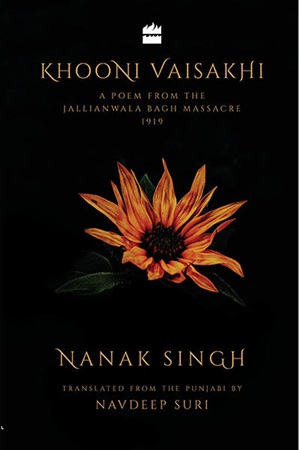Mar 31, 2025
Mar 31, 2025
 On the night of September 08, 2024; I attended a program as part of Houston – JLF (Jaipur Literary Festival), which featured Navdeep Suri, grandson of Nanak Singh reading from the book Khooni Vaisakhi, originally written in Punjabi and now with its English translation by him. The book originally published in May 1920, was banned by the British rulers in India soon after its publication, considered as seditious literature for gory depiction of the Jallianwala Bagh Massacre of 1919.
On the night of September 08, 2024; I attended a program as part of Houston – JLF (Jaipur Literary Festival), which featured Navdeep Suri, grandson of Nanak Singh reading from the book Khooni Vaisakhi, originally written in Punjabi and now with its English translation by him. The book originally published in May 1920, was banned by the British rulers in India soon after its publication, considered as seditious literature for gory depiction of the Jallianwala Bagh Massacre of 1919.
On that fateful day of April 13, 1919, General Dyer opened fire on a peaceful crowd estimated to be 20,000 inside a community park known as Jallianwala Bagh in Amritsar, which killed almost a thousand unarmed civilians.
Young Nanak Singh, 22-year-old attended that event with his two friends who lost their lives there. He was lucky to have witnessed, survived the bloodshed and had written a searing ballad titled, Khooni Vaisakhi. All the printed copies were confiscated and destroyed, as the book was banned. In the year 2019, on the occasion of the centenary of the massacre, it was published again by his grandson with English rendering by him.
What an interesting turn of events. A poetry book by a young budding Punjabi writer Nanak Singh was banished by the draconian rules of the rulers of the times. A century later it is on the market with a new twist. Now, it has English rendering along with original Punjabi from his own grandson. What a unique revival for a book which did not get a chance to reach the masses at the height of nationalistic fever. Now a century later, it is not only available to Punjabi readers alone, but it has become available to a worldwide audience. The bloody Vaisakhi of 1919 has finally revealed the effects of its crimson colors a century later. Not sure how many emotional chords it will touch a century later, but for every heart it touches, the haunting words of Nanak Singh will keep echoing in their ears:
![]()
Translation (by me and not by Suri):
Today we are going (on a mission) to satiate the hungry hawk…. Today we are going (to make a river of) blood flow (with our blood).
The pain and the anguish that he felt in his tender heart is expressed by him in these words:
![]()
Translation (by Suri in poetry):
Says Nanak Singh, Ah! The pain of Punjab! Words choke as I speak, they suffocate.
The session was at the Eternal Gandhi Museum, Houston where Navdeep Suri was in a conversation with Sanjoy Roy. The discussion was very stimulating and nostalgic as the writer, being a grandson was privy to a lot of family lore. The conversation was paused for singing of songs from the book by Balkar Singh, accompanied by Biplab Samadder, Raja Banga and Avanti Priyadarshani on instruments. Balkar Singh had just two days to prepare but his rendering of the pain and agony of the brutality in classical ragas was astounding. The program was called Songs of Punjab: Narrative of Resilience was truly a bleeding testimony of the torture that commoners were subjected to, on the holiest day of Vaisakhi, where Nanak Singh lamented on their fate in these words:
![]()
Translation (by Suri in poetry):
Says Nanak Singh; can’t stop them now for nation’s sake to die they go.
Now that was the spirit of resilience. It felt good to see the grandson providing a new fillip, new life to the legacy of his grandfather and the author. Even this is a form of resiliency to lasting legacy of Nanak Singh, as now his name will be known beyond Punjab. My only suggestion will be the program could have been very emotionally bonding for the audience if Naveen Suri would have shared some pictures of Nanak Singh, as it would have left a lasting imprint. The receptive audience would have appreciated the works and penmanship of Nanak Singh.
References:
Suri, Navdeep & Singh, Nanak. Khooni Vaisakhi.
21-Sep-2024
More by : Bhupinder Singh